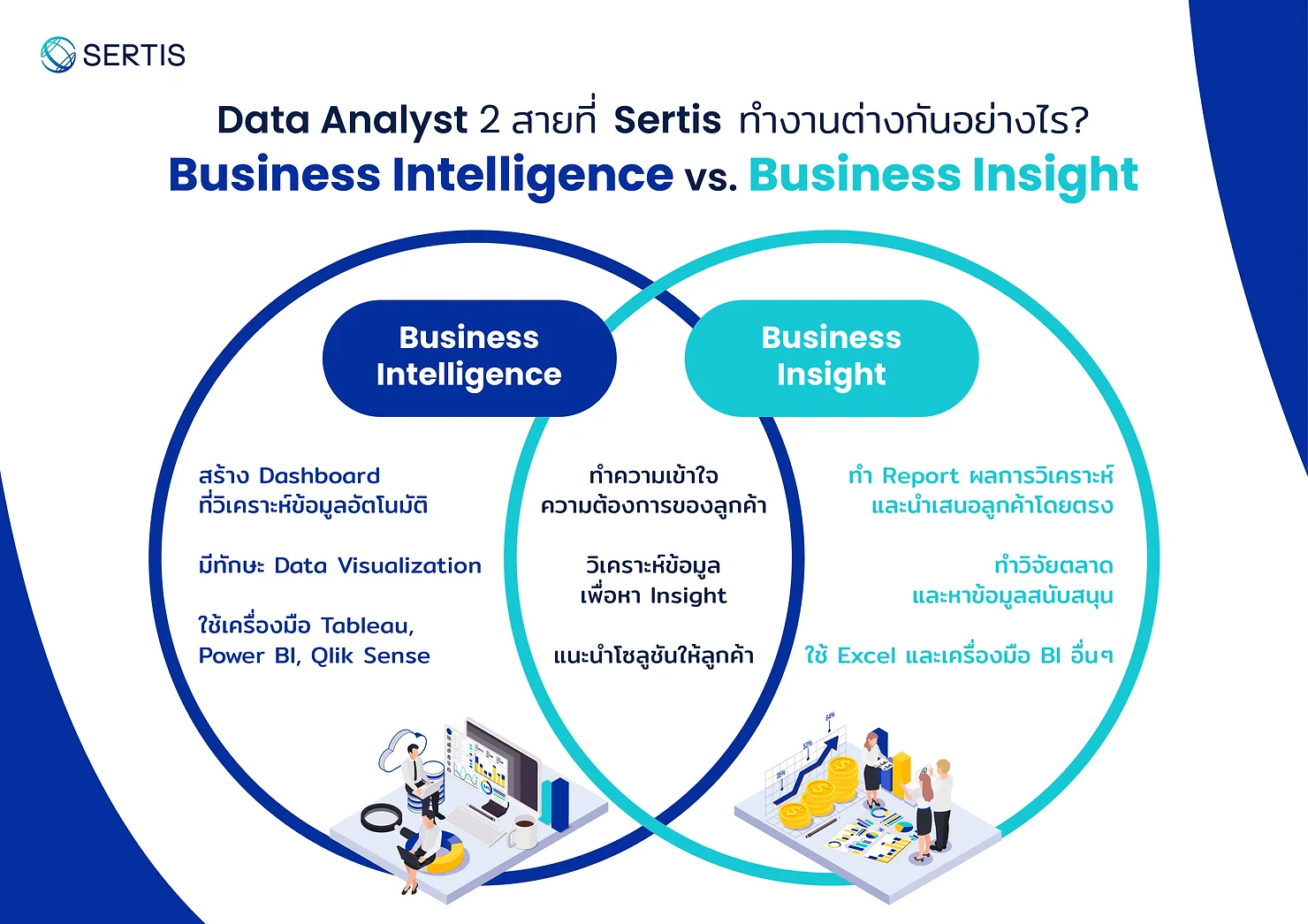
At Sertis, we have two types of data analysts: those focused on business intelligence and those focused on business insight. You might be curious about how these two roles are different and which one is the best fit for you. Let's find out in this article.
A data analyst is one of the most in-demand roles in Sertis. We also have new-generation teams who dedicate themselves to continuous learning and growth. Most importantly, our data analysts have a unique opportunity to work with clients from leading companies across various industries, including retail, which is the industry that relies heavily on data and is able to maximize profits from data, making an ideal environment for a data analyst to develop their skills and advance their careers.
Data analysts' core responsibility is turning data into information, information into actionable insights, and insights into business decisions that make a difference in businesses.
However, at Sertis, among our data analysts, we divide roles for different specializations to enable them to focus on specific tasks and deliver high-performing results. We have two specializations of data analysts, Business intelligence and Business insight. In this article, we will take you through these two roles to help you understand the differences and identify which suits you best.
Data Analyst - Business Intelligence
A business intelligence data analyst has the opportunity to work with clients from various industries to turn their data into actionable solutions, design user-friendly automated dashboards, and present insights along with suggested solutions. The detailed tasks include:
Collaborate with clients to gather information, understand their unique needs, and align business requirements with technical requirements to address specific pain points.
Collect data from internal and external sources, such as sales figures, operational performances, and market trends.
Develop user-friendly dashboards that automate data analytics, present findings in simple and easily understandable formats, and provide recommendations to solve problems and enhance business performance.
Data Analyst - Business Insight
Similarly, a Business insight data analyst focuses on turning data into actionable solutions. The difference is their tasks are mainly dedicated to understanding clients' unique business characteristics, collecting and analyzing data to address problems, and delivering findings to clients. The detailed tasks include:
Collaborate with clients to gather information, understand their unique needs, and align business requirements with technical requirements to address specific pain points.
Collect data from internal and external sources, such as sales figures, operational performances, and market trends.
Conduct data analytics and generate reports based on clients' requirements.
Persuasively present findings in an actionable and easily understandable way.
Provide insights and recommendations that address the pain points and enhance business performance.
Research to find supporting evidence to motivate clients to take action based on the insights.

After examining the detailed tasks and responsibilities for each role, let's take a look at how these two roles are similar and different.
Similarities
They both are required to work closely with clients to understand their business model and specific needs. They also work with various types of data from internal and external sources, and they are responsible for data-related tasks, ranging from collecting data to conducting analysis.
Differences
Business intelligence data analysts focus more on creating a dashboard that automates data analytics, utilizing data visualization techniques, to provide clients with a 24/7 accessible dashboard that generates the analysis results they need. In contrast, business insight data analysts find insights and present them directly to clients, along with business recommendations supported by evidence in their reports. They also provide clients with close consultations as well. Their scope of work, therefore, focuses more on research and client-facing communications.
Skills and requirements for data analysts at Sertis
Data Analyst - Business Intelligence
Experience in business data, data visualization, and storytelling with data
Proficiency in using data visualization tools such as Tableau, PowerBI, or Qlik sense
Ability to connect BI tools with various data sources
Data Analyst - Business Insight
Strong understanding of business analytics and consulting
General understanding of business data and storytelling
Experience with Excel or any BI tools
Ability to apply market research techniques and strategies across a variety of digital channels
Experience in working directly with clients, including running assessment or requirements-gathering workshops
Requirements for both roles
Proficiency in SQL and experience with database management
Strong communication skills, both verbal and written
Ability to take a leadership role when necessary
Critical thinking with analytical, troubleshooting, and problem-solving expertise
If you are interested in one of these roles, please visit our website to find more information and to apply.
We also have job openings for various AI and data-related positions. If you find your dream job, don't hesitate to apply. Excellent opportunities are waiting for you at Sertis.